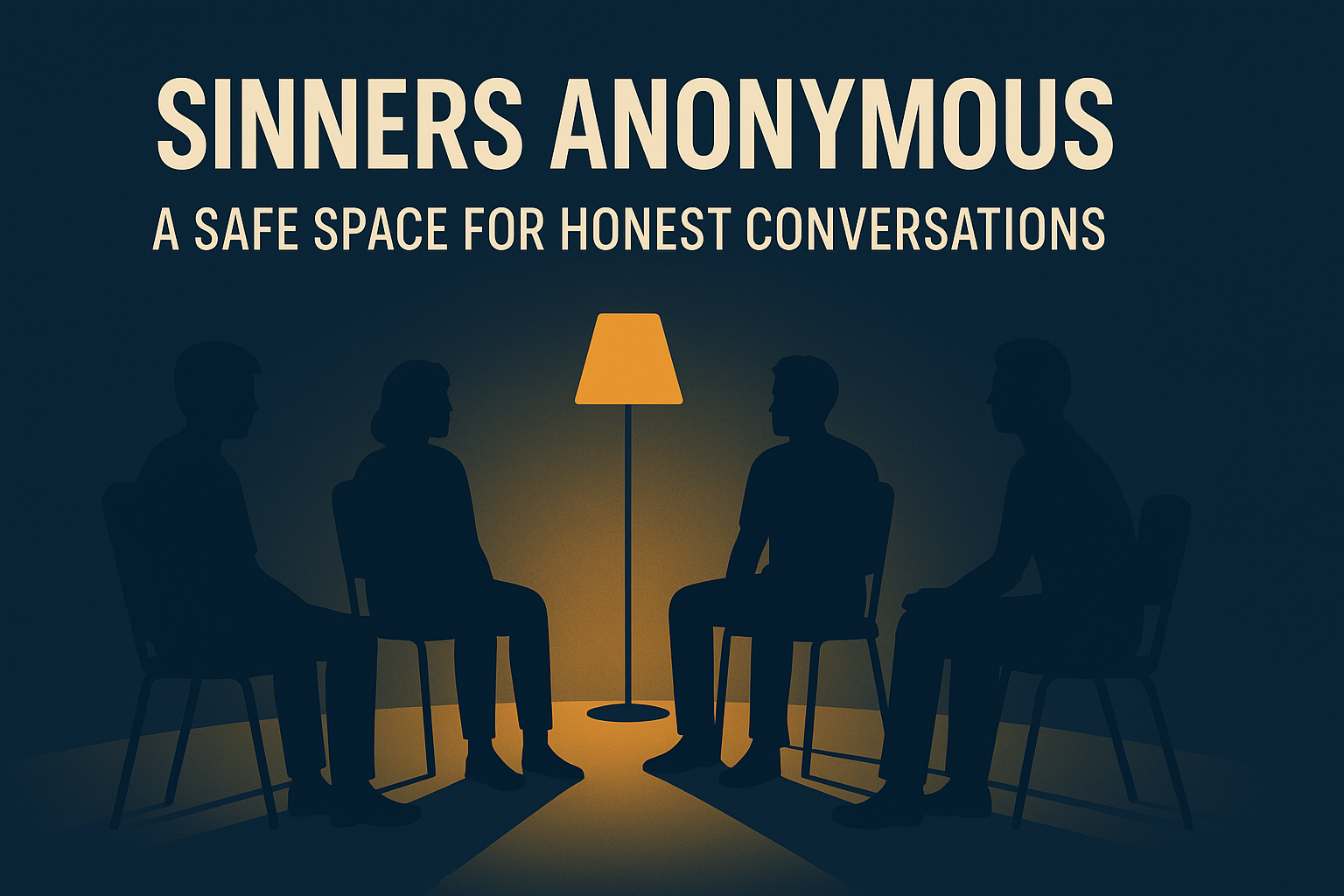Ever heard of Sinners Anonymous and wondered what it’s really about? You’re not alone. Whether it popped up in a conversation or your feed, this mysterious name gets people curious. In this article, we’ll explore what Sinners Anonymous is, how it works, who it’s for, and why so many people are drawn to it. You’ll learn about its origins, what happens inside, and whether it might be something worth checking out for yourself.
No pressure—just honest info, real stories, and a clear look inside a group that’s often misunderstood.
Feeling like you’re stuck in a cycle of guilt, regret, or mistakes no one seems to understand? You’re not the only one. That’s where Sinners Anonymous comes in—a lesser-known space where people show up with all their flaws and find something real.
This article breaks down everything you need to know: what Sinners Anonymous is, how it’s different from traditional recovery groups, who joins it, and whether it might help you or someone you love. If you’ve ever wished for a place to be fully human—no judgment, just honesty—this might be worth exploring.
Here’s everything you need to know.
What Is Sinners Anonymous, Really?
Is It a Support Group, a Movement, or Something Else?
Let’s start with the big question: what exactly is Sinners Anonymous? The name alone sparks curiosity—and maybe even a little unease. But it’s not as intimidating as it sounds. Sinners Anonymous is, at its core, a community. Some call it a support group, others see it as a movement. Truth is, it blends both.
Unlike traditional recovery programs that focus on specific addictions or behaviors, Sinners Anonymous opens the door to anyone wrestling with inner struggles—regret, guilt, self-doubt, or patterns they just can’t shake. It’s less about labels and more about honesty.
You won’t find a one-size-fits-all definition because it’s designed to be flexible. Think of it as a safe space to be messy, vulnerable, and real—with others doing the same.
Who Started Sinners Anonymous and Why?
The origin story? It’s a mix of mystery and grassroots truth. Sinners Anonymous wasn’t created by a corporation or a church. It began with a small group of people who felt like they didn’t belong anywhere else.
They weren’t looking for perfection—they were looking for connection. Rumor has it that the founders were former members of other recovery groups who wanted something less structured, more raw. They needed a space where they could show up as their whole selves, no matter how imperfect.
So they started their own thing—and it quietly grew. Word-of-mouth, private forums, invite-only meetups. No big marketing. Just people helping people.
How Sinners Anonymous Works (And What to Expect)
The Basics: Meetings, Members, and Method
If you’re wondering how it all works, here’s the rundown. Meetings are the heartbeat of Sinners Anonymous. They’re held both online and in person, depending on your location. Some are weekly, some biweekly—there’s no strict schedule across the board.
The vibe? Very low-pressure. You’re not forced to share. You don’t have to give your real name. You can just sit, listen, and take it in. People come from all walks of life—parents, creatives, business folks, students.
There’s no official curriculum or workbook. Instead, meetings are shaped around open discussion, storytelling, and reflection. Some meetings are themed (like forgiveness or fear), while others are free-flowing.
Is It Religious or Secular? What You Should Know
This one comes up a lot. Despite the spiritual-sounding name, Sinners Anonymous is not tied to any religion. You don’t need to believe in God to be part of it. In fact, many members identify as agnostic or spiritual-but-not-religious.
Some meetings may include a moment of silence or a reading with a philosophical slant, but there’s no preaching. The goal isn’t conversion—it’s connection. And everyone’s belief system is respected.
So if you’ve been burned by judgmental religious spaces, don’t worry—this one’s different.
How Confidential Is It, Really?
Trust is huge here. Sinners Anonymous takes privacy seriously. While there’s no legal confidentiality like in therapy, there’s a strong cultural norm: what’s shared in the group stays in the group.
Members are encouraged to use first names only—or even pseudonyms. Meetings usually start with a reminder about respect and confidentiality. And because the community’s built on mutual vulnerability, breaches of trust are rare and frowned upon.
It’s not airtight, but it’s close. And for many, that’s enough to finally open up.
Why People Join Sinners Anonymous in the First Place
Common Struggles That Lead People Here
People don’t land in Sinners Anonymous because life’s perfect. Most come with emotional baggage they’ve carried for years—shame, addiction, betrayal, loss. But not all stories are dramatic.
Some just feel stuck. Like they’re going through the motions. Others are tired of pretending to be okay. They want to stop hiding the parts of themselves they think are “too much.”
Whether it’s a toxic relationship, a harmful habit, or just the ache of not belonging, there’s one thing they all share: the need for real, honest connection.
Real Stories from Real Members (Anonymized)
One member, who goes by “Nate,” shared how he kept sabotaging every relationship because he believed he didn’t deserve love. He said hearing others admit similar things cracked something open in him.
Another, “Riley,” described being the high-achiever who looked fine on the outside but was drowning in anxiety. “I didn’t even know how to tell people I was hurting. SA gave me words.”
These stories may be anonymized, but they’re deeply real. And for many, just hearing “me too” is enough to start healing.
The Rules and Culture Inside Sinners Anonymous
What’s Allowed—and What’s Absolutely Not
Here’s the thing—Sinners Anonymous may be chill, but it’s not a free-for-all. There are some ground rules:
- No shaming, preaching, or advice-giving (unless asked)
- No interrupting or dominating conversations
- Total respect for each person’s story and pace
That said, it’s not rigid. People cuss. People cry. People are human. But the space stays safe because of these few, simple boundaries.
Is Judgment Left at the Door? Let’s Be Honest
Well… mostly. No group is perfect. But Sinners Anonymous tries. The culture is radically accepting. Messy pasts? Welcome. Ongoing struggles? Totally okay. No need to be “fixed.”
And if someone crosses a line, it’s usually called out gently—because the goal is growth, not guilt.
Bottom line: it’s one of the few places where being imperfect isn’t just accepted—it’s the whole point.
Sinners Anonymous vs. Traditional Recovery Programs
How It Compares to AA, NA, and Other Groups
At first glance, Sinners Anonymous might remind you of Alcoholics Anonymous or Narcotics Anonymous. There’s the group format, shared stories, and focus on healing. But it’s less structured—no 12 steps, no sponsorships.
The difference? SA isn’t just for addiction. It’s for anyone carrying emotional weight. While AA sticks to alcohol and NA focuses on narcotics, SA is open to broader life messiness.
If AA is a manual, Sinners Anonymous is more like an open journal.
What Makes It Stand Out or Controversial?
Not everyone gets it—and that’s okay. Some critics say it’s too loose, too undefined. Others argue that without a structured program, people might not make real progress.
But fans of SA say that’s the point. The freedom to just be—without fixing, labeling, or diagnosing—is what makes it powerful. And yes, controversial.
Does Sinners Anonymous Actually Help?
What the Community Says About Its Impact
Here’s what’s interesting—most members say the biggest change isn’t dramatic. It’s subtle. They feel lighter. Less alone. More honest.
One regular said, “I didn’t stop messing up overnight. But I stopped lying to myself about it.”
It’s not therapy. It’s not a cure. But for many, it’s a turning point.
Are There Any Studies or Proof Behind It?
As of now, no big academic studies have been done on Sinners Anonymous. It’s still flying under the radar in many ways.
But anecdotal evidence? There’s plenty. Online forums, testimonials, and growing attendance speak volumes. Maybe science will catch up. Until then, people are trusting their gut—and each other.
Who Can (and Can’t) Join Sinners Anonymous
Are There Any Requirements or Restrictions?
Short answer? Nope. There are no official barriers to entry. No fees. No diagnoses required. No forms to fill out.
You just have to show up—and be real. That’s it.
Is It Just for Addicts or Something Broader?
Definitely broader. While some members struggle with addiction, others are there for emotional or relational patterns they want to break.
If you’ve ever felt like you didn’t quite fit in traditional recovery or self-help spaces, SA might be a better match.
How to Find a Sinners Anonymous Meeting Near You
Online vs. In-Person: What’s the Difference?
Online meetings are great for privacy and convenience. You can log in with a nickname and camera off if you want. Perfect for testing the waters.
In-person meetings? More intimate, deeper conversations, and the chance to build real-life support. But they might be harder to find depending on your area.
Try both and see what feels right.
What to Expect on Your First Visit
Expect warmth. Expect silence. Expect honesty.
You won’t be pressured to talk. Many people just listen during their first few meetings. Bring an open mind—and maybe a journal.
And yes, it might feel weird at first. But give it time. You might just feel seen for the first time in a long while.
Is Sinners Anonymous Right for You?
Questions to Ask Yourself Before Joining
- Do I feel like I’m carrying emotional baggage I can’t shake?
- Have I tried other groups but didn’t feel like I fit?
- Am I craving a space where I can be fully myself?
If any of those hit home, SA might be worth a shot.
Other Alternatives If You’re Not Sure
Not ready for SA? That’s okay. Consider:
- Traditional therapy
- Support groups with specific focuses (grief, trauma, etc.)
- Journaling or online communities
The point is: healing has many paths. SA is just one of them.
Final Thoughts: The Truth About Sinners Anonymous
Sinners Anonymous isn’t for everyone—but for some, it’s everything. It’s messy, raw, and beautifully real.
It’s not a miracle cure. It’s a mirror. And sometimes, that’s all we need—to be seen, heard, and reminded that we’re not alone in our messiness.
Whatever your story is, there’s space for it here.
You’re not the only one. And you don’t have to go it alone.
Looking for more inspiration, tips, and expert advice from Sinners Anonymous? Head over to Style World Magazine — your one-stop spot for everything Blog-related!




